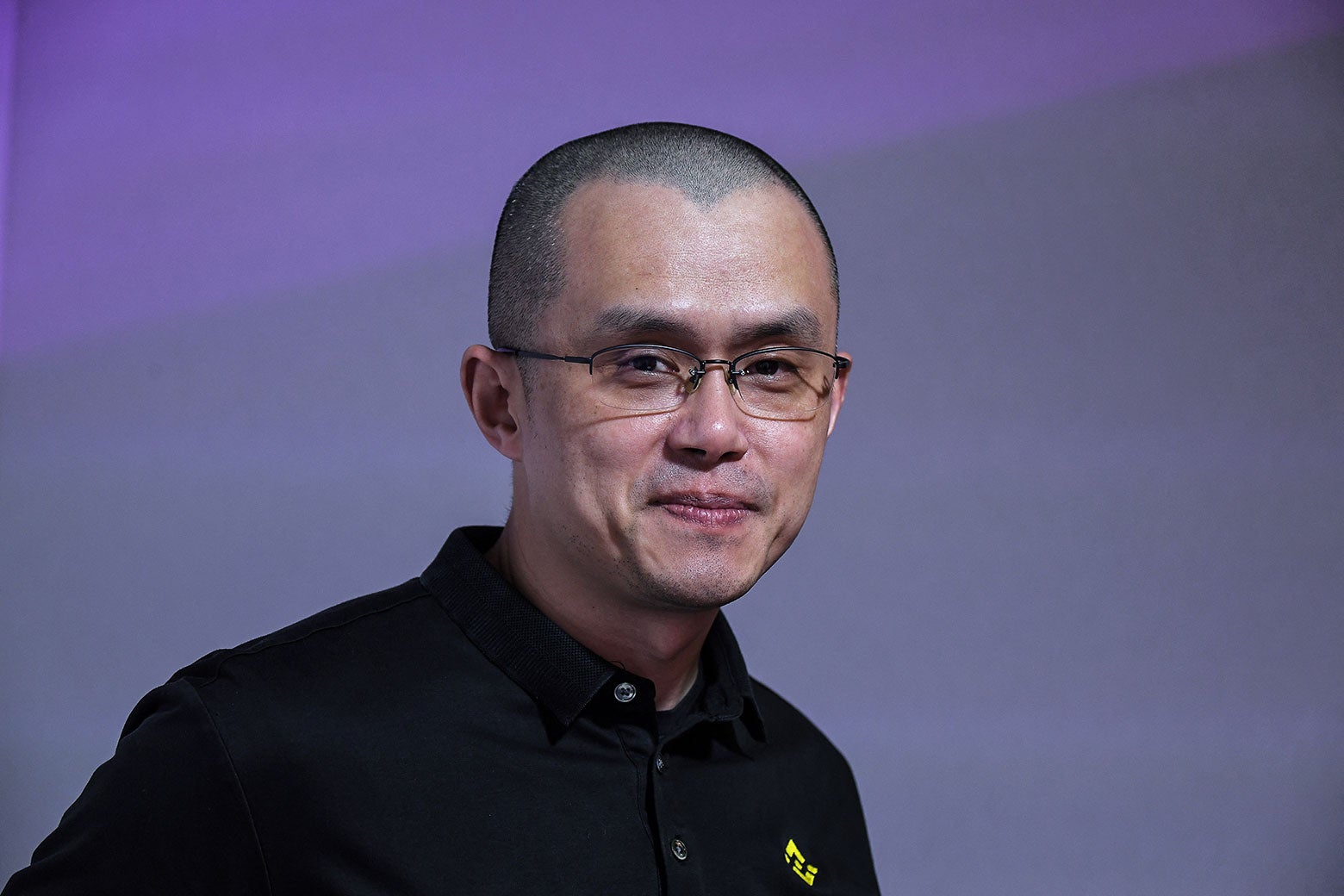Sign up for the Slatest to get the most insightful analysis, criticism, and advice out there, delivered to your inbox daily.
In 2023, Changpeng Zhao—founder and former CEO of Binance, the biggest crypto exchange in the world—pleaded guilty to money-laundering violations. He served a four-month prison term and paid a $50 million fine. Zhao, usually called “CZ” in crypto circles, had to leave his role leading Binance but maintained his ownership of the exchange. This spring, Binance made a deal with Donald Trump’s crypto firm to host the president’s stablecoin, generating tens of millions of dollars for Trump and his family. Now Zhao has gotten something very good in return: a pardon, perhaps clearing the way for him to take back his old job.
The Trump administration says that this is one thing: a righting of the Biden administration’s antipathy toward crypto. White House press secretary Karoline Leavitt says that Zhao “was prosecuted by the Biden administration in their war on cryptocurrency. The Biden administration’s war on crypto is over.” Of course, Zhao’s pardon is actually another thing: the latest step in Trump’s legalization of financial crimes if the people committing them are either fans of his or, more ideally, enriching him.
The prosecution of Zhao wasn’t even about crypto. Yes, Zhao ran (and still owns) the biggest crypto exchange on the planet. But the U.S. does not have criminal laws tailored to crypto, because of a mixture of politicians not understanding the technology and being on the take from the industry, which would prefer not to have its leaders prosecuted. Zhao pleaded guilty to a much more old-school financial crime: facilitating money laundering. His crime was not providing a forum for people to speculate with crypto, or doing some weird pump-and-dump scheme, or even doing a “rug pull,” in which someone launches a new form of crypto, hypes it up, and sells it before the crash. No, Zhao just let criminals use Binance to wash money and didn’t try hard to stop them. Crypto was merely the scenery.
Some confusion on this point would be understandable. Trump’s business relationships with crypto interests would constitute a presidency-ending scandal in any other administration in United States history, with the possible exception of his first one. And on some level, the pardon of Zhao is just another handout to an industry—and a specific kingpin—that has enriched Trump, his family, and his friends. But to frame this as a crypto story, as the White House is trying to do, misses a big part of Trump’s mission. Yes, he likes money and patronage, but he also has an ideological commitment to leniency for fraudsters, scammers, and crooks, on a level that exceeds anyone who has come before him.
Financial criminals have long been the stars of the show when it comes to presidential pardons and sentence commutations. In 2021, the Rand Corporation published the results of a study funded by the Bureau of Justice Statistics. Researchers found that between 2001 and 2012, more than half of applications to the Justice Department’s Office of the Pardon Attorney were from people who committed fraud or other “white-collar crimes.” Together, they made up 59 percent of successful applications, with fraudsters succeeding in 5.8 percent of their efforts and non-fraud white-collar criminals hitting at a 6.8 percent rate. Needless to say, people convicted of drug offenses (a 3 percent success rate), firearm crimes (1.3 percent), and violent crimes (zero) did not do as well, although burglary, theft, and larceny applicants did manage a 6.7 percent success rate. Not a single money-laundering criminal made a successful appeal in this decade-plus, but maybe Zhao just had a compelling backstory.
Trump, however, has embraced fraudsters and white-collar criminals in a historic way. Right now, the president is on a run of pardoning financial crooks the likes of which we’ve never seen before. Trump is to this breed of criminal right now what Jeremy Lin was to the NBA in winter 2012. Shohei Ohtani is setting new standards for a multitalented MLB player, but Ohtani is no more of a unicorn in baseball than Trump is, this very moment, in the realm of letting fraudsters and scammers off the legal hook.
Already this year, according to the DOJ’s count, Trump has pardoned or commuted the sentences of 16 people or companies who were guilty of fraud. Trump’s first pardons were to a bunch of Jan. 6 rioters on the day of his inauguration, but his next one was to Ross Ulbricht, the Silk Road founder, fraudster, and money-laundering conspirator who was a crypto cause célèbre. He pardoned Rod Blagojevich, who went down on eight counts of wire fraud, among other charges. He pardoned a Republican donor who defrauded investors in his electric truck company. He commuted the prison sentence of a media criminal and bullshitter who impersonated a YouTube executive to fool Goldman Sachs into giving him money. He just commuted the sentence of George Santos, who defrauded an elderly veteran who will no longer be owed hundreds of thousands of dollars in restitution. And now he has pardoned Zhao, paving the way for his business associate to get back to his old perch.
Trump, as established, did not invent the pardon for financial crimes. But where he is distinguishing himself, in historic terms, is with his immediacy. The Office of the Pardon Attorney’s statistics database shows how presidential clemencies break down over a president’s term. In Joe Biden’s first year, he did not issue a single pardon or commutation. In 2017, the first full year of Trump’s initial term, he granted one pardon. Barack Obama granted nothing in either of his first two years, 2009 and 2010. Nor did George W. Bush in 2001 and 2002, or Bill Clinton in 1993 and 1994. The previous president to hit triple digits in his first year was Gerald Ford. One of them is more famous than the others.
Trump outstripped Ford by a multiple when he pardoned more than 1,500 Jan. 6–ers on his first day. But the president is now up to 73 other pardons and commutations just this year. More than a fifth are for people who committed fraud, specifically, then there are the myriad other financial crimes: bribery, conspiracy, “knowingly and willfully permitting a convicted felon to be engaged in the business of insurance,” “aiding and assisting in the preparation of false and fraudulent tax returns,” “willful failure to pay trust fund taxes; failure to file return/information,” five instances of violations of the Bank Secrecy Act, and more. It’s not clear how many financial crimes are ultimately punishable by law in the U.S. and how many are subject to a sliding scale of “It’s fine” depending on Trump’s whims.
One particular financial criminal remains in jail, for now. Sam Bankman-Fried, a onetime rival of Zhao’s, has been behind bars since the summer of 2023, when the judge presiding over his trial ordered him jailed over pretrial hijinks. Bankman-Fried was convicted later that year, but he has spent the first year of the Trump administration playing for the president’s ear. He has played up the concept that he’s in prison only because of the Biden administration’s anti-crypto overreach. He’s hoping that Trump notices that the judge who presided over his trial was also the judge who oversaw the E. Jean Carroll defamation suit against Trump, in which the president was found liable for sexual abuse. One of the prosecutors on Bankman-Fried’s case was the lawyer who resigned as an acting U.S. attorney earlier this year rather than drop the corruption case against New York Mayor Eric Adams. (Eventually, the feds found a lawyer shameless enough to do it.) I don’t know if Bankman-Fried will persuade Trump to let him out of his 25-year sentence, but if he doesn’t get out, it will only be because highly placed crypto executives prefer he be treated like the industry’s black sheep. It doesn’t matter that Bankman-Fried’s convictions weren’t really about crypto either, but garden-variety fraud. Actually, that might help him.



